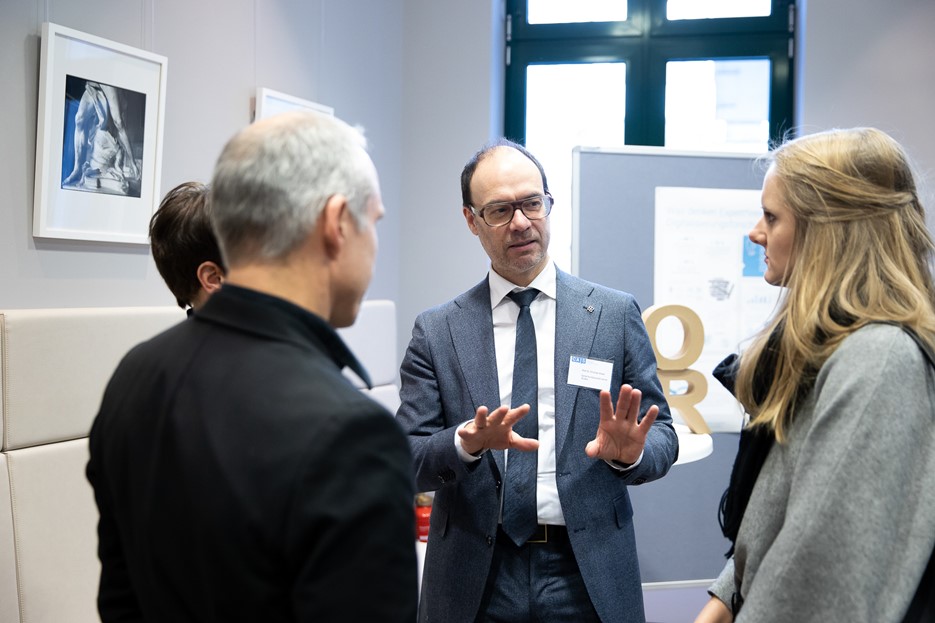Digitization of sustainable behavior

The project investigates the potential for resource conservation that arises from detailed measurement of energy and water consumption during showering using smart meters. Interventions will be used to test how smart meter data can be used to motivate behavioral change. A welfare analysis will also consider psychological cost and benefit factors of smart meter applications for the first time.

By testing different behavioral economics interventions based on smart meter applications for the shower, we can test how smart meter data can be used to motivate behavior change. In addition, we are conducting a welfare analysis to evaluate the value that users place on these interventions.
Smart meters for everyone?
The European Union (EU) has set itself the ambitious goal of introducing smart meters in 80% of households. In doing so, the EU expects to install 200 million smart meters for electricity and 45 million for gas by 2020, at an estimated total cost of around €45 billion. Given the high investment costs, there is considerable disagreement in individual countries as to whether the benefits of these smart meter technologies really exceed these costs.
Studies evaluating smart meters in the electricity sector find rather small effects of smart meter applications on electricity consumption, amounting to 3 to 5% consumption reductions (McKerracher and Torriti 2013). However, initial studies on water consumption have demonstrated average effects of over 20% from smart meter applications for showering in Switzerland and Singapore (Tiefenbeck et al., 2018 and 2019).
Since showering is an activity with very large both energy and water consumption, a successful smart meter deployment could thus substantially save resources. For example, in a typical household, a shower of less than 5 minutes uses about 45 liters of hot water and thus about as much energy as two refrigerators and all the lighting in an average household require per day (Tiefenbeck et al., 2018).
Behavioral economics meets digitization in everyday life
We will conduct a field study in which 600 households will receive smart meters for showers. In the form of a randomized controlled field experiment, the effect of different ways of providing smart meter information to consumers on resource consumption will be evaluated. In addition, a welfare analysis will be conducted to determine the value consumers place on this information provision.
What we can learn from this
In addition to deepening our knowledge of the savings that can be achieved with smart meters, the welfare analysis provides information on how consumers subjectively value the provision of information. Are they happy to learn more about their consumption behavior, or does it spoil the pleasure of showering? This question is of considerable relevance in assessing the acceptance and potential of the widespread use of smart meters and similar technologies.
“The growing demand for energy and water causes global environmental problems as well as social tensions and makes an effective policy for resource conservation necessary. In this project, we are investigating what potential for resource conservation is opened up by the digital measurement of consumption in the household with the aid of so-called smart meters (intelligent electricity meters).”
Dr. Mark A. Andor
Project Manager
Sustainability: Digitization of sustainable behavior
Project start: 01.01.2020
Research partner: RWI – Leibniz Institute for Economic Research
Pressemitteilung: “Nachhaltigkeit: Smarte Duschköpfe können Wasserverbrauch erheblich senken”
Literature
McKerracher, C., & Torriti, J. (2013). Energy consumption feedback in perspective: Integrating Australian data to meta-analyses on in-home displays. Energy Efficiency, 6(2), 387-405.
Tiefenbeck, V., Götte, L., Degen, K., Tasic, V., Fleisch, E., Lalive, R., & Staake, T. (2018). Overcoming salience bias: How real-time feedback fosters resource conservation. Management Science, 64(3), 1458-1476.
Tiefenbeck, V., Wörner, A., Schöb, S., Fleisch, E., & Staake, T. (2019). Real-time feedback promotes energy conservation in the absence of volunteer selection bias and monetary incentives. Nature Energy, 4(1), 35.
Participating researchers





